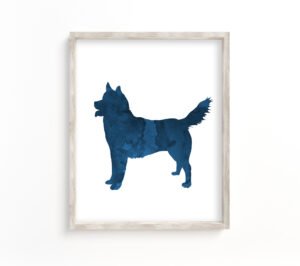Can a Dog Eat White Chocolate?
Can a dog eat white chocolate?
Dogs can eat white chocolate in moderation.
Chocolate can be toxic for dogs, but some types of chocolate are more dangerous than others. For example, white chocolate is not nearly as harmful as dark chocolate.
Read on and figure out why!
Why is white chocolate different?
Chocolate is toxic to dogs because it contains a chemical called theobromine. Dark chocolate must have cocoa to be considered dark. White chocolate doesn’t contain any cocoa solids – instead, it’s mainly cocoa butter, sugar, and milk solids.
Even though white chocolate still contains small amounts of theobromine, it’s not even close to the amount found in chocolate made with cocoa solids.
There is approximately 900 mg theobromine in 100 grams of dark chocolate, while the same amount of milk chocolate contains approximately 200 mg and approximately 0.90 mg in 100 grams of white chocolate.
For a better overview:
ca. 900 mg in 100 grams of dark chocolate
ca. 200 mg in 100 grams of milk chocolate
ca. 0.90 mg in 100 grams of white chocolate.
And since there’s very little theobromine in white chocolate, our dogs can enjoy it without having to worry about getting poisoned!
That said, you still have to be careful because white chocolate contains high amounts of sugar. Speaking of sugar, don’t feed your dog anything that contains Xylitol, a sugar substitute that causes low blood sugar when ingested by dogs. Even small amounts can cause seizures, liver failure, and even be deadly.
White chocolate also contains milk, which might be bad for your dog if he has any allergies to dairy or lactose.
If you give your dog white chocolate, do so in moderation, like one or two small pieces per week as a treat. If your dog is overweight, feed him less.
In a Nutshell
Can a dog eat white chocolate? Yes, they can – in moderation, because even though white chocolate contains very little theobromine, it still has lots of sugar and is unhealthy for your dog.
What happens when a dog eats normal chocolate?
Theobromine belongs to a group of chemicals called methylxanthines. This chemical stimulates the central nervous system and affects the heart and muscles. Chocolate contains different amounts of theobromine depending on the recipe used and its percentage of cocoa solids which determine whether it’s considered milk, dark or white chocolate. When ingested by our canine friends, they experience effects as us such as nausea, vomiting, restlessness, increased heart activity, muscle tremors, irritability (barking, etc.), increased urination/diuresis. These are only some of its adverse effects, depending on the type and amount of chocolate ingested.
If you believe your dog has eaten some chocolate, make sure to call your veterinarian, as they must see your dog immediately to prevent any further damage to their health.
Love Dogs? Get an Art Print from our shop! Perfect for decorating your home fast, easy, and affordable, with an artwork of your favorite dog! Get yours now!
-
 $20.00 – $29.00 inc. VatSelect options This product has multiple variants. The options may be chosen on the product page
$20.00 – $29.00 inc. VatSelect options This product has multiple variants. The options may be chosen on the product page -
 $20.00 – $29.00 inc. VatSelect options This product has multiple variants. The options may be chosen on the product page
$20.00 – $29.00 inc. VatSelect options This product has multiple variants. The options may be chosen on the product page -
 $20.00 – $29.00 inc. VatSelect options This product has multiple variants. The options may be chosen on the product page
$20.00 – $29.00 inc. VatSelect options This product has multiple variants. The options may be chosen on the product page -
 $20.00 – $29.00 inc. VatSelect options This product has multiple variants. The options may be chosen on the product page
$20.00 – $29.00 inc. VatSelect options This product has multiple variants. The options may be chosen on the product page -
 $20.00 – $29.00 inc. VatSelect options This product has multiple variants. The options may be chosen on the product page
$20.00 – $29.00 inc. VatSelect options This product has multiple variants. The options may be chosen on the product page -
 $20.00 – $29.00 inc. VatSelect options This product has multiple variants. The options may be chosen on the product page
$20.00 – $29.00 inc. VatSelect options This product has multiple variants. The options may be chosen on the product page -
 $20.00 – $29.00 inc. VatSelect options This product has multiple variants. The options may be chosen on the product page
$20.00 – $29.00 inc. VatSelect options This product has multiple variants. The options may be chosen on the product page -
 $20.00 – $29.00 inc. VatSelect options This product has multiple variants. The options may be chosen on the product page
$20.00 – $29.00 inc. VatSelect options This product has multiple variants. The options may be chosen on the product page